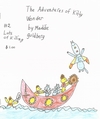Today I had signings at Mysteries to Die For in Thousand Oaks and at the Mystery Bookstore in Westwood….and I landed both those gigs because I was with a young, attractive, female author named Madison Goldberg. Without her, I doubt I would have wrangled the invites.
At the Mystery Bookstore, Maddie and I signed with my good friend Jerrilyn Farmer, who’s new book FLAMING LUAU OF DEATH has just been released. Of course, Maddie out-sold both of us combined. It helps to be young and single.
Naturally, the whispers among all of us authors (Jerrilyn, Gary Phillips, Tom Nolan, Gayle Lynds, and Bob Levinson, to name a few) revolved around the notable absense of proprietor Sheldon MacArthur. The latest news, depending on who you talk to, is that he’s retired and is moving up north to either start a mystery-themed magazine, a mail-order bookstore or a nudist colony for remaindered crime writers. Whatever his new endeavor might be, we all wish him well.
After the signing, Maddie and I went up the street to visit my old pal Paul Jackson, a prolific TV writer who has opened a Rocky Mountain Chocolate Factory outlet on Broxton Avenue as a sideline. Business was booming when we were there… it was probably thanks to my daughter . Now that Maddie has annointed it with her patronage, all her groupies will start going there. Show your WGA card if you visit his store and maybe Paul will give you free sample. It worked for me.






